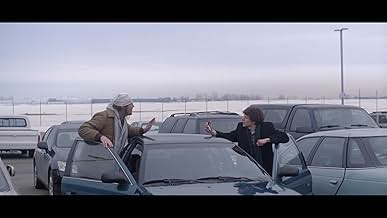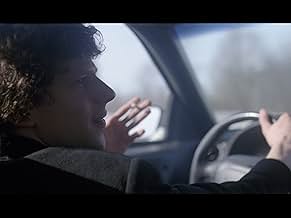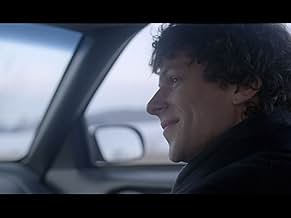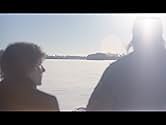Ajouter une intrigue dans votre langueThe story of the five-day interview between Rolling Stone reporter David Lipsky and acclaimed novelist David Foster Wallace, which took place right after the 1996 publication of Wallace's gr... Tout lireThe story of the five-day interview between Rolling Stone reporter David Lipsky and acclaimed novelist David Foster Wallace, which took place right after the 1996 publication of Wallace's groundbreaking epic novel, 'Infinite Jest.'The story of the five-day interview between Rolling Stone reporter David Lipsky and acclaimed novelist David Foster Wallace, which took place right after the 1996 publication of Wallace's groundbreaking epic novel, 'Infinite Jest.'
- Réalisation
- Scénario
- Casting principal
- Récompenses
- 4 victoires et 18 nominations au total
- Bookstore Patron 2
- (as Jennifer Holman)
- Student 5
- (as Javon Anderson)
Avis à la une
I don't expect everyone to like it to the degree that I did because I can only base my strong inclination towards this movie on the connection I personally made with it which was emotional rather than intellectual, although the film is rich and lingering in its intellect as well, and of course; I recognize what makes this film profound, which I'll try to explain.
This is a talky film from director James Ponsoldt, who I'd now have to rank as one of my favorite contemporary directors after this and another I've seen and loved, The Spectacular Now. This director isn't one you'd normally find on a list ranking among the greatest working today because he's not about style and doesn't appeal to the ego as much as other contemporaries such as Wes Anderson and David Fincher do (in addition to many others, not to single them out). No, Ponsoldt is subtle and reserves his ego. He is unimposing on the lives of his characters and candid about what his films are trying to do and say, not hiding beneath film rhetoric or allegory or the impression of a representational work. And what's great about this is how his films point out that you don't need intricate sets or perfectly symmetrical shots to create beauty. This film has some of the most beautiful shots I've seen (the shot of them walking in the snow, the shot of the normally- withdrawn Wallace dancing), all the more so because of their subtlety, giving the feeling that the beauty was discovered and not created by the director.
But the beauty is often created by the actors. Ponsoldt trusts his actors and puts his efforts towards making the characters come alive before our eyes. I was under the fantastic impression that I was witnessing a completely real human soul with Segel's performance. He felt so real, so three dimensional. I understand him, even though I am not him. This is more magical to me than sweeping camera movements or extravagant art direction.
I didn't realize when watching the film that the dialogue is all based on, if not directly taken from, the tapes journalist (and protagonist) David Lipsky (Eisenberg) recorded of his interviewee, universally acclaimed novelist David Foster Wallace (Segel). The dialogue is rich with insight into the character's thought processes and their observations on life (but mostly those of Wallace). I was riveted at every moment the two were talking, feeling as though being revealed before me were the truths of life. The thrill of being a fly on the wall. And it's not just the words containing the wisdom of the thoughtful and complicated Wallace, but the delivery via the actors and the way in which the many hours of tape are edited to allow Wallace's ideas and observations to resonate. Even beyond Wallace's ideas, the film cuts to the core and observes Wallace as a human being, not different for his brilliance but the same for his humanness.
The film is about so many things it would be overwhelming to attempt list all of them. Its ideas, however many, are all-encompassing of what it means to exist, which is, beyond the desire for fame and ego-boosts, to want to be understood. The film observes how the inner-worlds of all people are so uniquely complicated and pays tribute to that wonder. I'll be relating my experiences to this film in time to come.
Probably the only unfortunate part of all this is that this movie is not going to have wide appeal. It is almost exclusively about the real life meeting between a Rolling Stone journalist and newly minted super-author David Foster Wallace, back in the 90s. As such it is almost all dialog meant to convey a sense of Mr Wallace's breadth of knowledge about popular culture and his imagination.
There's little drama or action here in the usual sense. Still Mr Segel is most effective in breathing life into the man such that you would love to have known him. Even his co-star, Jesse Eisenberg, who I don't usually warm up to, is quite up to the task at hand, i.e., sparring with the great author to get the real man down on paper.
I loved the film, but I must make special mention that, for a film filled with dialog, for once, I caught every word. There was no asking my wife, what did he say? Why can't every film be as carefully constructed?
Jason Segel absolutely owned this film, with an eye opening & career-defining performance far from his usual comfortable roles in comedies. His portrayal of David Foster Wallace was so on point, that the complexities of the character naturally flourishes. Also, his expositions simply captivates. His robust & free flowing delivery leaves us, the audience, in the exact same position as Jesse Eisenberg's character - hanging onto his every detail, with a craving for more.
Apart from Segel's Oscar worthy delivery, the illuminating subject matters were just as mesmerizing. As our leads converse on love, loneliness, fame, career & social trends, the film then connects on a personal level, in more ways than one. It is a kind of film that invites self-reflection & embeds ideas on how to live life.
Overall, The End of the Tour is a film that imparts reverence for the character that is David Foster Wallace, by way of picking through the brains of the great writer. It does so through incredibly true and entertaining intellectual discussions that offers the film's inspiring moments. Brilliantly acted, thought provoking and profoundly moving, this independent film demands deeper appreciation, and I happily oblige.
Le saviez-vous
- AnecdotesThe song heard on the soundtrack when the film ends is "The Big Ship" by Brian Eno, one of David Foster Wallace's favorite songs. It was also used for the climax of This is not a love story (2015), another film that premiered at the 2015 Sundance Film Festival.
- GaffesIn regards to the scene where Mrs. Gunderson gives Mr. Wallace and Mr. Lipsky a car tour of Minneapolis sites: The Mary Tyler Moore statue on Nicollet Mall in Minneapolis, was not given to the City by TV Land until 2002. Also, it is not legal for cars to drive down Nicollet Mall.
- Citations
David Foster Wallace: It may be in the old days what was known as a spiritual crisis: feeling as though every axiom in your life turned out to be false... and there was actually nothing. And that you were nothing. And that it's all a delusion and you're so much better than everybody 'cause you can see how this is just a delusion, and you're so much worse because you can't fucking function.
- Crédits fousHalfway through the closing credits, there is an extra scene told from the perspective of David Foster Wallace as Lipsky goes to the bathroom to wash out the chewing tobacco. It shows what Wallace did while he was in the bathroom: he speaks privately into the tape recorder.
Meilleurs choix
- How long is The End of the Tour?Alimenté par Alexa
Détails
- Date de sortie
- Pays d’origine
- Site officiel
- Langue
- Aussi connu sous le nom de
- El último tour
- Lieux de tournage
- Sociétés de production
- Voir plus de crédits d'entreprise sur IMDbPro
Box-office
- Montant brut aux États-Unis et au Canada
- 3 002 884 $US
- Week-end de sortie aux États-Unis et au Canada
- 123 238 $US
- 2 août 2015
- Montant brut mondial
- 3 072 991 $US
- Durée
- 1h 46min(106 min)
- Couleur
- Mixage
- Rapport de forme
- 2.35 : 1






















